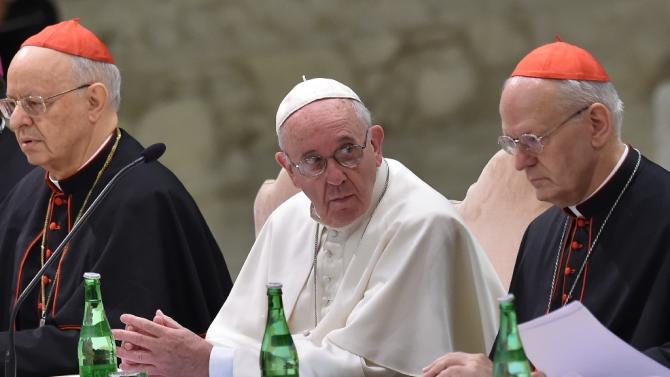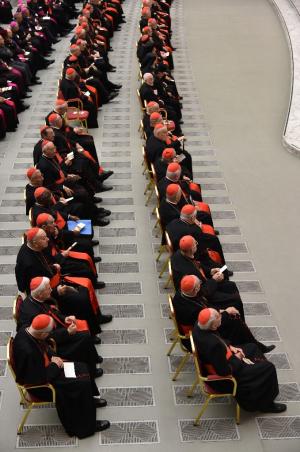Pope seen set to urge flexibility as family synod wraps up
Vatican City (AFP) - With one week to go before the end of the Vatican's global council on the family, Pope Francis appears increasingly likely to shrug off conservative pressures and recommend the Church take a one-to-one approach to sinners.
The 78-year-old pontiff has attended each synod session of cardinals and bishops, quietly taking notes and apparently determined not to intervene in the debate, despite provocative remarks from some of a Vatican stitch-up.
The conservative camp has complained that synod procedures for talks on the stance that the Church should adopt towards homosexuals and divorced couples were "designed to facilitate predetermined results" -- and have vowed to block any liberal bids for change.
But the pope has warned bishops not to be taken in by conspiracy theories and looks determined to push on for a more flexible approach from the Church towards sinners.
On Saturday Francis acknowledged the bickering, saying the three-week meeting should see "lay people, pastors and the Bishop of Rome (the pope) walk together", a task "easy to express but not as easy to put into practice".
And he promised not to interfere, saying that although he has the final word on the ideas submitted by the synod, the pope is "called to speak... not based on his own convictions but as a supreme witness... to the will of God".
Francis has yet to indicate whether the final document drawn up by the synod will be published, and his unwillingness to be drawn on what changes, if any, he thinks should be made to the Church's teachings has ruffled feathers.
But Philippe Bordeyne, rector of the Institut Catholique de Paris invited to the synod as an expert, said while "some prelates would have liked him to say in advance what he will do... that would defeat the (purpose of) the synod".
- Pope 'won't force it' -
The pope has hinted at the line he is hoping will be adopted, however: the idea emerging is for those currently excluded from the Church to be dealt with on a case-by-case basis by their local bishops.
The aim would be more flexibility towards people whose lifestyles are not in line with the institution's teachings but without altering dogma -- a compromise it is hoped will please most bishops, who want change but nothing radical.
Francis said Saturday it was "not appropriate for the pope to take the place of local bishops in discerning the problems in their territories." Instead, he said, the Church should "proceed with a healthy 'decentralisation'."
The suggestion got a hearty round of applause from the assembled prelates.
Such a change could mean that while marriage will remain between a man and a woman and for life, bishops could potentially decide whether or not a divorced but remarried member of their flock can take communion, for example.
At the opening of the synod, the pope had insisted the Church must have "its doors open to welcome all those who knock", and must not "point the finger in judgement" of others, because doing so would "betray its mission".
He reminded the red-hatted cardinals and purple-sashed bishops that the Church was "not a museum to keep or preserve. It's a place where the holy people of God move forward".
However, some experts warn he is unlikely to act against the wishes of the majority.
"The pope could move forward more quickly alone, but he does not want to," said Corriere della Sera's Vatican expert Gian Guido Vecchi. "The Church needs time to change."
The conservative camp has complained that synod procedures for talks on the stance that the Church should adopt towards homosexuals and divorced couples were "designed to facilitate predetermined results" -- and have vowed to block any liberal bids for change.
But the pope has warned bishops not to be taken in by conspiracy theories and looks determined to push on for a more flexible approach from the Church towards sinners.
On Saturday Francis acknowledged the bickering, saying the three-week meeting should see "lay people, pastors and the Bishop of Rome (the pope) walk together", a task "easy to express but not as easy to put into practice".
And he promised not to interfere, saying that although he has the final word on the ideas submitted by the synod, the pope is "called to speak... not based on his own convictions but as a supreme witness... to the will of God".
Francis has yet to indicate whether the final document drawn up by the synod will be published, and his unwillingness to be drawn on what changes, if any, he thinks should be made to the Church's teachings has ruffled feathers.
But Philippe Bordeyne, rector of the Institut Catholique de Paris invited to the synod as an expert, said while "some prelates would have liked him to say in advance what he will do... that would defeat the (purpose of) the synod".
- Pope 'won't force it' -
The pope has hinted at the line he is hoping will be adopted, however: the idea emerging is for those currently excluded from the Church to be dealt with on a case-by-case basis by their local bishops.
The aim would be more flexibility towards people whose lifestyles are not in line with the institution's teachings but without altering dogma -- a compromise it is hoped will please most bishops, who want change but nothing radical.
Francis said Saturday it was "not appropriate for the pope to take the place of local bishops in discerning the problems in their territories." Instead, he said, the Church should "proceed with a healthy 'decentralisation'."
The suggestion got a hearty round of applause from the assembled prelates.
Such a change could mean that while marriage will remain between a man and a woman and for life, bishops could potentially decide whether or not a divorced but remarried member of their flock can take communion, for example.
At the opening of the synod, the pope had insisted the Church must have "its doors open to welcome all those who knock", and must not "point the finger in judgement" of others, because doing so would "betray its mission".
He reminded the red-hatted cardinals and purple-sashed bishops that the Church was "not a museum to keep or preserve. It's a place where the holy people of God move forward".
However, some experts warn he is unlikely to act against the wishes of the majority.
"The pope could move forward more quickly alone, but he does not want to," said Corriere della Sera's Vatican expert Gian Guido Vecchi. "The Church needs time to change."
The pope may also ask groups of experts after the synod to look further still into sensitive doctrinal issues.
"Francis in no case wants to divide the Church," said Ignazio Ingrao, religious expert for Panorama magazine.
"There is common agreement on 90 percent of the issues. On the last 10 percent, the pope is looking to see if it's possible to find a point of agreement. If not, he will not force it."




No comments:
Post a Comment